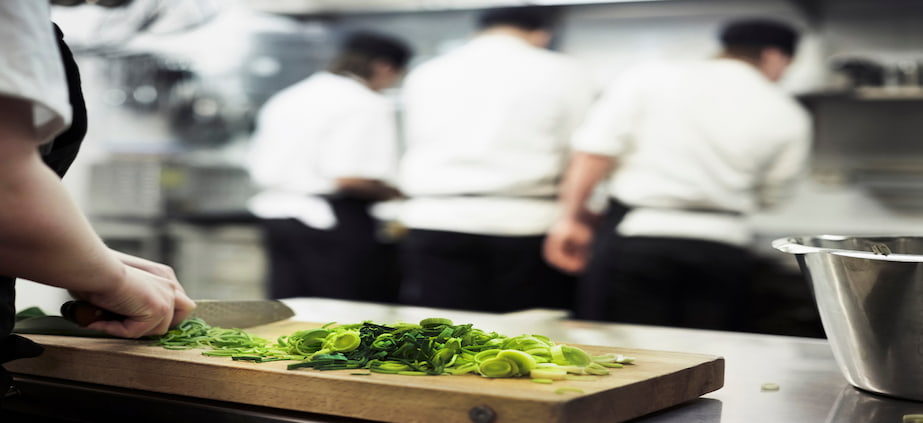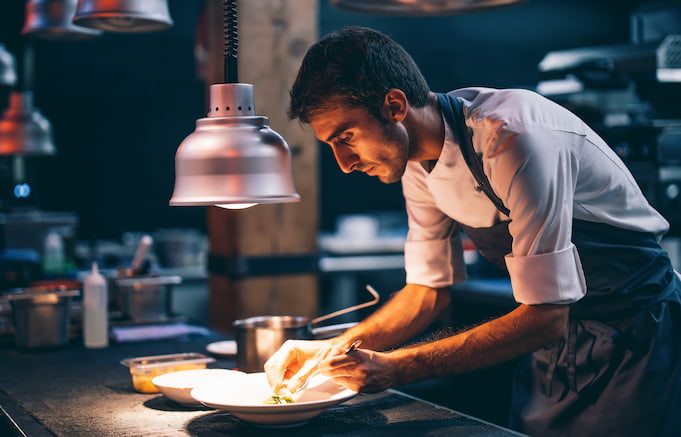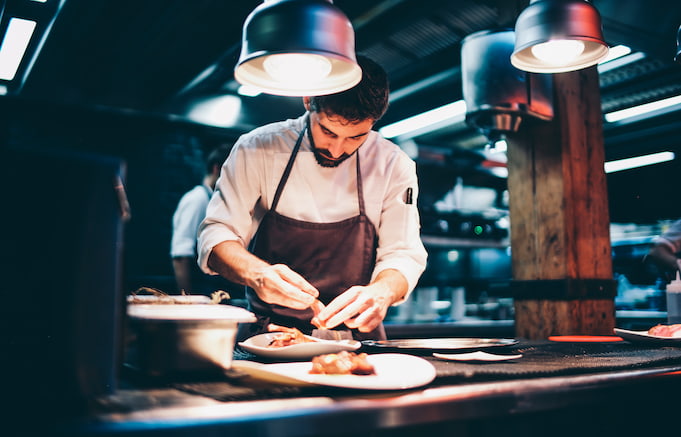What is sustainable food and how can we eat more of it?

Whether you're looking to start a culinary career or want to enhance your job prospects in the food business, there is always more to learn.
Sustainable food is an increasingly important subject due to concerns about the environment, climate, food waste, and greenhouse gas emissions.
Many high-end restaurants and top chefs in the world are focusing on the sustainability of their food. In this article, we'll look at the different aspects of sustainable food, including what it is, the main issues, and how restaurants can reduce their environmental impact.
We'll also go over how you can prepare yourself for a career in sustainable food.
Understanding sustainable food
Sustainable food is all about making sure food preparation does not harm the environment for future generations.
This means food needs to be produced and transported in a way that avoids producing greenhouse gasses, depleting resources, and overfarming agricultural land.
Sustainable food also helps promote social justice and support local economies.
Principles of sustainable food production
The main tenets of sustainable food are:
- Use of organic farming
- methods Reduction of food waste
- Support for local farmers and fair prices for food
- Conservation of water and energy
- Protection of soil health in the long term
What is the main goal of sustainable food production?
Sustainable food production is aimed at meeting current requirements without compromising the ability of future generations to meet theirs. This includes environmental, social, and economic needs.
What are the benefits of sustainable food?
Among the main benefits of sustainable food production are:
- Enhanced flavor Healthier options and more well-rounded diets
- Low carbon footprint
- Supporting local farmers to reduce poverty in agricultural areas
- Fewer animals are raised and killed in unsuitable environments
Sustainable farming techniques
Every amazing dish in the culinary arts starts with farming, but it’s becoming increasingly important to know where that food comes from and how sustainable it is.
Some agriculture is associated with the use of harmful chemicals, overuse of water, or stripping nutrients out of the soil, so to become more sustainable, the focus should be on methods with lower impact such as:
- Organic farming: agriculture that avoids the use of harmful chemicals
- Regenerative agriculture: a system of farming that nurtures soil health and protects the local air and water by growing a diverse range of crops
- Permaculture: this is the concept of using land, resources, and manpower in a manner that produces no waste.
- Agroecology: focuses on mitigating climate change by reducing emissions and resources and using local supply chains.
Exploring sustainable food systems
Farming is only the first part of the sustainable food equation. There are many other factors to consider when it comes to food sustainability, including:
- Processing: from the way food is harvested to the way it is prepared and packaged.
- Distribution: the methods used to transport and sell food.
- Consumption: how food is cooked and the way it is disposed of afterwards.
Key players in sustainable food systems
If you are embarking on a chef career and want to work sustainably, you will need to cooperate with all the main players in the food system, including:
- Farmers
- Food processors
- Distributors
- Retailers
- Consumers
What is a local sustainable food chain?
One of the main ways to make food more sustainable is by using local food chains, which encompass production, processing, distribution, and consumption.
This minimizes the distance between the farm and restaurants, reducing the carbon footprint of food production and consumption. Not only is this more environmentally friendly, it can help support local farmers and improve food security for areas that typically export a lot of their food.
It can also lead to people eating fresher food and healthier diets with fewer preservatives.
Focusing on local food chains is beneficial for many restaurants as it can be a great selling point.
Among ways of supporting local food chains are:
- Buying local food.
- Supporting local farmers' markets or buying straight from farmers.
- Eating seasonal food rather than imported or hydroponically grown food.
- Growing your own food.
What is the future of sustainable food?
Sustainable food is often called the future of food since sustainability is essential to our ability to continue producing food for generations to come. But what does the future hold for food sustainability? Some of the emerging trends include:
- New tech: restaurant technology that can reduce restaurants’ carbon footprints and their reliance on packaging is being developed all the time.
- More regulations: new policies and guidelines from the Food and Agriculture Organization of the United Nations will shape the direction of sustainable agriculture and food.
- Plant-based: more and more people are turning to plant-based foods for health purposes, to reduce carbon emissions, and to prevent cruelty to animals.
Education and skills required to work in sustainable food
There are a number of different educational paths you can take if you want to pursue a career in sustainable food, but the most advisable route is through culinary school.
Getting a respected culinary arts degree will give you the skills and know-how you will need to develop a successful career.
World-class culinary degrees
With expert tuition and professional internships at leading restaurants, our degrees set you up for sustainable career success.
Alongside a sound education, you will need to work on a wide range of skills that are essential for a career in sustainable food.
These include:
- Knowledge of sustainable farming practices
- Ability to work independently and as part of a team
- Communication
- Problem-solving
- Leadership Knowledge of healthy diets
Career opportunities in sustainable food
There are many career options that you could look into if sustainable food is your passion, including:
- Sustainable food consultant: helping restaurants, caterers, and other businesses adopt more sustainable practices. This includes food production, processing, distribution, and consumption. They typically have a background in sustainable agriculture, environmental studies, or a related field
- Sustainable food chef: create delicious and nutritious meals that are also good for the environment, using sustainable ingredients and cooking techniques and employing food waste reduction practices.
- With the right culinary education, you can design sustainable menus for restaurants, hotels, or other venues
- Sustainable food educator: teachers who help others make more sustainable food choices. They work in a variety of settings, such as schools, community centers, and online. This can be a particularly rewarding career path for people who want to highlight the importance of sustainability
- Sustainable food policy analyst: research and develop policies that promote sustainable food, from production to consumption. You could work for government agencies, non-profit organizations, and businesses
- Sustainable food entrepreneur: start and run businesses that promote sustainable food, including restaurants, food delivery services, and food processing companies. Food entrepreneurship can be a particularly rewarding path if you want to be your own boss or if you have a great idea of how to improve sustainability.
There are also plenty of alternative careers for chefs that you could look into, such as food writing, food and beverage management or public speaking.

Boost your career options
With industry-leading insights and exceptional opportunities for real-world experience, our diploma can prepare you for success in the world of sustainable food.
Conclusion
The sustainability of food is becoming more important, not least due to our rising population and the limited resources available.
If you are interested in the culinary arts, there are many career options open to you that incorporate sustainable food.
As a good starting place, you should look at attending culinary school and increasing your knowledge of the science of cooking to get a solid foundation for your career.



